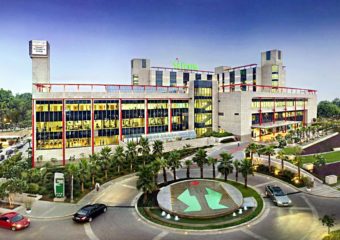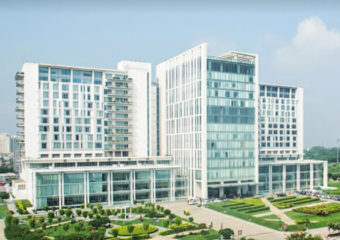Best kidney Stone Removal Cost in India
How Much Does Kidney Stone Removal Cost in India?
Many potential patients for surgery are concerned to know about Kidney Stone Removal cost in India? The estimated cost of Kidney Stone Removal in India usually starts $3000 however, it may go up to as much as $12,000. It depends on the hospital charges and the fee charged by the surgeon. This price usually does not cover the post-operational physiotherapy program. Additional costs also involve the diagnostics before the surgery and pre-operational consultations.

What Is Kidney Stone?
Kidney stones are stones that form in any part of the urinary tract. These are hard deposits of salt and minerals such as calcium or uric acid that cannot be dissolved by the body. When your urine has high levels of these minerals and salts, kidney stones develop. Kidney stones can start small but can grow larger in size, even filling the inner hollow structures of the kidney. Kidney stones can be very painful as their size increases or the stones move towards the bladder. If the stone reaches the bladder, it can be passed out of the body in urine. When these stones get stuck in the ureter, urine flow can be blocked which can cause immense pain.
Facts about Kidney Stones
- Kidney stones can be as small as a grain of sand or as big as a golf ball. Some stones can be smooth while others can be snaggy. Some kidney stones can be yellow while some stones can be brown.
- Kidney stones are medically known as renal calculi.
- It is not necessary that these stones occur only in the kidneys. The stones can develop anywhere in the urinary tract- kidneys, ureters, bladder, urethra.
Causes of Kidney Stones
Everyone should have the habit of drinking an ample amount of water regularly. The explanation is a straightforward one-forestalling the advancement of gallstones. We should drink 6-8 glasses of water in a day which produces more than one liter of urine per day. The chances of stones developing increases when you drink less water than the necessary need. The essential purpose behind the development of kidney stones is low urine volume. When the volume of fluid in the urine is less, the urine becomes concentrated and dark in color. As the urine becomes concentrated, the salts in the urine don’t dissolve. People who are at higher risk of developing kidney stones are-
- You have had kidney stones before.
- Someone in your family has had kidney stones.
- You don’t drink enough water.
- You follow a diet high in protein, sodium and/or sugar.
- Being obese or overweight
- People who have recently undergone Gastric bypass surgery
- People suffering from hyperparathyroid condition or inflammatory bowel diseases such as Ulcerative Colitis or Crohn’s disease
- Certain medications such as diuretics, anti-seizure drugs, etc.
Symptoms of Kidney Stones
For very small kidney stones, you won’t experience any pain or symptoms. But for a large stone, it can cause immense pain, especially on one side of the back or abdomen, as it descends towards the ureters. This immense pain is known as renal colic. Sometime the stone can become stopped in the ureter which prompts expanding of kidneys (hydronephrosis). This is another reason for acute pain. The pain occurs and disappears in waves as the stone travels to the bladder through the ureter.
If you have a larger kidney stone, you may notice any of the following symptoms
- Pain while urinating
- Blood in your urine
- Burning sensation while urinating
- Sharp pain in your back or lower abdomen
- Nausea and vomiting
- Red/Pink/Brown urine due to blood in the urine
- Fever
- Frequent urge to urinate
- When you urinate, a small amount of urine is discharged
Types of Kidney Stones
The following are the types of kidney stones-
Calcium stones:- 80 percent of people are diagnosed with calcium kidney stones, It is most common type of kidney stones. They are usually made of calcium and oxalate (a natural chemical found in most foods), hese kidney stones can be further categorized into two types-
- Calcium oxalate- These stones form when you eat a lot of high-oxalate food such as potato chips, peanuts, chocolate, beets, spinach.
- Calcium phosphate- These stones form due to conditions such as hyperparathyroidism or urinary tract infections.
Uric Acid Stones:- Uric acid stones form when your urine is often too acidic. Uric acid can form stones by itself or with calcium.
Struvite Stones:- More common in women, struvite stones form as a result of certain types of urinary tract infections. These stones tend to grow quickly and become large, sometimes occupying the entire kidney. Left untreated, they can cause frequent and sometimes severe urinary tract infections and loss of kidney function.
Cystine stones:- Cystine stones are made of a chemical that your body makes naturally, called cystine. Cystine stones are very rare, and happen in people who have a genetic disorder that causes cystine to leak from the kidneys into the urine.
Diagnosis of Kidney Stones
If your Surgeon suspects that you have a kidney stone, you may have diagnostic tests and procedures, such as:
Blood Testing:- Blood tests may tell how much calcium or uric acid in your blood. Blood test results help monitor the health of your kidneys and may lead your Surgeon to check for other medical conditions.
Urine testing:- The 24-hour urine collection test may show that you’re excreting too many stone-forming minerals or too few stone-preventing substances. For this test, your Surgeon may ask you that perform two urine collections over two consecutive days.
Imaging:- Imaging tests may show kidney stones in your urinary tract. High-speed or dual energy computerized tomography (CT) may reveal even tiny stones. Simple abdominal X-rays are used less frequently because this kind of imaging test can miss small kidney stones.
Ultrasound, a noninvasive test that is quick and easy to perform, is another imaging option to diagnose kidney stones.
Analysis of passed stones:- You might be asked to urinate through a strainer to get stones that you pass. Lab examination will uncover the cosmetics of your kidney stones. Your primary care physician utilizes this data to figure out what’s causing your kidney stones and to frame an arrangement to forestall more kidney stones.
What are the treatments for kidney stones?
The treatment for a kidney stone depends on the size of the stone, what it is made of, whether it is causing pain and whether it is blocking your urinary tract. To answer these questions and to figure out the right treatment for you, your Surgeon can decide the right treatment with the help of above diagnosis. Blood tests, urine test, Imaging,
Small Kidney stones with minimal symptoms
Most small kidney stones won’t require invasive treatment. You may be able to pass a small stone by:
- Drinking water. Drinking as much as 1.8 to 3.6 liters a day will keep your urine dilute and may prevent stones from forming. Unless your doctor tells you otherwise, drink enough fluid — ideally mostly water — to produce clear or nearly clear urine.
- Pain relievers. Passing a small stone can cause some discomfort. To relieve mild pain, your doctor may recommend pain relievers such as ibuprofen (Advil, Motrin IB, others) or naproxen sodium (Aleve).
- Medical therapy. Your doctor may give you a medication to help pass your kidney stone. This type of medication, known as an alpha blocker, relaxes the muscles in your ureter, helping you pass the kidney stone more quickly and with less pain. Examples of alpha blockers include tamsulosin (Flomax) and the drug combination dutasteride and tamsulosin (Jalyn).
Large stones and those that cause symptoms
Kidney stones that are too large to pass on their own or cause bleeding, kidney damage or ongoing urinary tract infections may require more-extensive treatment. Procedures may include:
Shock wave lithotripsy.
In This Procedure uses shock waves to break up the kidney stones into small pieces. After the treatment, the small pieces of the kidney stone will pass through your urinary tract and out of your body with your urine. This procedure usually takes 45-60 minutes. The whole procedure is performed under the influence of light anesthesia. which means you will be asleep and unable to feel pain.

Advantages Shock wave lithotripsy
The main advantage of this treatment is that it treats kidney stones without an incision. As a result, hospital stays and recovery time are reduced.
How successful is shock wave lithotripsy?
ln those patients who are thought to be good candidates for this treatment, some 50-75% are found to be free of stones within three months of SWL treatment. The highest success rates seem to be in those patients with smaller stones (such as less than 1 cm).
After treatment, some patients may still have stone fragments that are too large to be passed. These can be treated again if necessary with shock waves or with another treatment.
Ureteroscopy
This Procedure perfomed under general anesthesia. Your Surgeon uses a long tool shaped like a tube to find and remove the stone or to find and break the stone into small pieces. If the stone is small, your Surgeon might be able to remove it. If it is large, it may need to be broken into small- small pieces. In this case, a laser will be used to break the stone into pieces that are small enough to pass through your urinary tract.

Advantages of Ureteroscopy
Ureteroscopy can treat stones located at any position in the ureter and kidney. Additionally, ureteroscopy allows the treatment of stones that cannot be seen on an x-ray. Certain patients who cannot be treated with ESWL or PERC, such as those who cannot safely stop taking blood thinners, women who are pregnant, and the morbidly obese, can be treated by ureteroscopy.
What are the risks?
There is a small chance of infection, bleeding, or injury to the ureter. lf the ureter is too small, a stent may be left in place for one or two weeks to keep the ureter open and then the procedure is performed at a later date.
Percutaneous nephrolithotomy (PCNL):-
In rare cases, a surgery called percutaneous nephrolithotomy is needed to remove a kidney stone. During the surgery, a tube will be inserted directly into your kidney to remove the stone. You will need to be in the hospital for two to three days to have and recover from this treatment.

What are the advantages and disadvantages?
One advantage of this surgery is that it is the most effective technique for making sure a patient is stone-free. Most patients leave the hospital stone free. Occasionally, though, another procedure will be needed to remove a stone.
Even though it involves an incision, it is less invasive than a full open surgery to treat the kidney stone. Because it is among the more difficult surgeries, it is performed by surgeons with specialized training. Urologists and radiologists may work together on these surgeries.
Open surgery:-
If there are complications like urinary infection or kidney damage, the doctor might recommend open surgery. Depending on the location of the stone, an incision is made. The surgeon uses a urethroscope to locate the kidney, which is broken down with special instruments and then removed.
Recovery From Kidney Stone Surgery?
The recovery time is usually fairly brief. After treatment, the patient can get up to walk almost at once, Many people can fully resume daily activities within one to two days. Special diets are not required, but drinking plenty of water helps the stone fragments pass. For several weeks, you may pass stone fragments.
What will happen after I leave the hospital?
After treatment, you will have blood in your urine and possibly abdominal pain or aching for several days. Some patients experience a severe cramping pain as shattered stone fragments make their way out of the body. Oral pain medication and drinking lots of water will help relieve symptoms.
Sometimes, the stone is not completely broken up, or big pieces remain and additional treatments may be needed.
Rarely, more serious problems occur, such as bleeding near the kidney that might require a blood transfusion, damage to the area around the stone, or pieces of the stone blocking the flow of urine.
Call Medicare Spots if you feel the strong need to urinate even after you empty your bladder or if you are in extreme pain even when taking your pain medicine.
Dietary Changes After Kidney Stones Treatment
Your Surgeon may recommend that you drink more fluids to help prevent new kidney stones from forming. He or she may also recommend dietary changes, such as decreasing the amount of animal protein in your diet, including beef, chicken, fish, and pork; eating more fruits and vegetables; and increasing your intake of calcium-rich foods.
Depending on the type of kidney stone you have, you may be asked to limit your intake of foods that are high in oxalate, such as beets, black pepper, black teas, chocolate, nuts, rhubarb, soy products, and spinach.
Frequently asked Questions Kidney Stones
Can kidney stone be removed without operation?
Most kidney stones can be treated without surgery. Ninety per cent of stones pass by themselves within three to six weeks. … extracorporeal shock-wave lithotripsy (ESWL) – ultrasound waves are used to break the kidney stone into smaller pieces, which can pass out with the urine.
How can I pass kidney stones naturally?
Natural remedies for kidney stones include:
- Drink more water. Any fluids will do if you’re dehydrated, but you should minimize coffee, alcohol, tea, and soda while passing a kidney stone.
- Drink lemon juice and olive oil. …
- Raw apple cider vinegar.
- Eat foods that are diuretic
How long does it take to recover from kidney stone surgery?
You may need to stay in the hospital for a few days. It can take 4 to 6 weeks to fully heal after open surgery
Best Urologist in India

Dr Sanjay Gagoi
Director , DNB, MCh, MS, MBBS 20 Years of Experience New Delhi , India

Dr Vikram Sharma
Director , MBBS, MS 29 years of experience Gurgaon , India

Dr. Narmada Prasad Gupta
Chairman , MBBS, MS, MCh 40 Years of Experience Gurgaon , India



